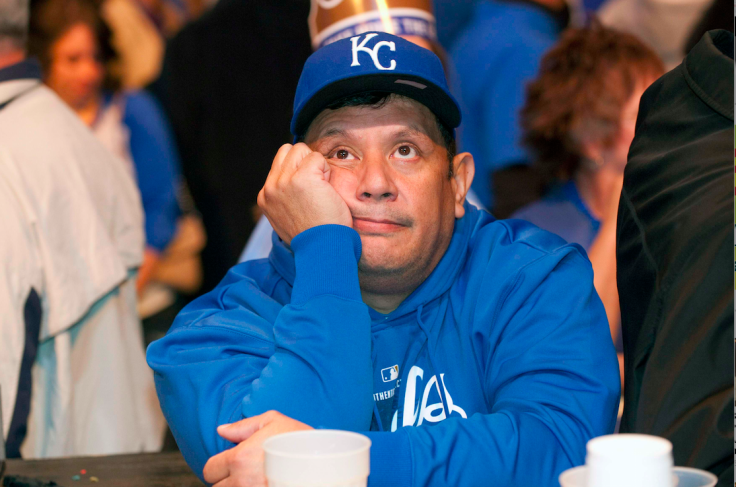World Series Business Impact: Royals, Not Giants, To See Bigger Jump In Revenue In 2015, Experts Say

The San Francisco Giants may have won this year’s World Series, but the Kansas City Royals don’t leave empty-handed. Bolstered by their first playoff run in three decades and a promising young roster, the Royals should see major increases in everything from ticket revenue to corporate sponsorships, experts say.
“Making it to the World Series, especially as a surprise team like the Royals, is an unambiguously good thing for the team,” Victor Matheson, an associate professor of economics at College of the Holy Cross in Massachusetts, said. “The team revenues were up this year and very likely to remain high next year, both due to higher ticket prices and in terms of tickets sold. It helps every aspect of the organization and it may help you attract and retain free agents. There are no downsides for the Kansas City Royals.”
The Royals could certainly use the bump. Entering the 2014 MLB season, the combination of a small market size and a 29-year playoff drought marked Kansas City as baseball's second-least-valuable franchise, according to Forbes. The team generated $35 million in ticket sales last season, compared to $129 million for the Giants. In 2013, the Royals drew an average of just 21,614 fans (their stadium holds 37,903) and missed the playoffs despite an 86-76 record.
That all changed this season, when a combination of strong pitching, timely hitting and solid defense allowed a young, little-known Royals roster to eke out a playoff berth for the first time since 1985. Regular-season attendance received a bump, jumping nearly 12 percent for an average of 24,154 per game.
But no one expected the playoff run that followed. The Royals and their 18th-ranked payroll swept the Los Angeles Angels in the ALDS and the Baltimore Orioles in the ALCS en route to a World Series berth. Their Cinderella run came to a halt in Game 7, thanks to a legendary effort from Giants pitching ace Madison Bumgarner, but by then, the economic ripples had already begun. Game 7 tickets sold on the secondary market Wednesday for more than $1,000.
The MLB’s revenue-sharing agreement takes a bite out of ticket sales, but gate receipts remain a baseball franchise’s most lucrative enterprise. With their once-flatlined fan base re-energized by a winning season, the Royals can justify an increased sale price for their tickets. And unlike a franchise like the Giants or the Boston Red Sox -- teams that draw huge crowds regardless of whether they’re competitive -- the Royals will have the ability in 2015 to vastly increase the number of tickets they sell.
“The Giants are already in the top five in attendance, so there’s not as much room [for growth],” Scott Bukstein, assistant director of the DeVos Sports Business Management program at the University of Central Florida, said. “With the Kansas City Royals, that’s the team where I think we’re going to see a greater impact in local revenue streams, including season ticket sales [and] single-game ticket sales.”
The Royals’ run in 2014 is comparable to that of the 2007 Colorado Rockies, another underdog team that turned a late-season charge into a World Series appearance. Like the Royals, the Rockies possessed middling attendance numbers before their rise to prominence -- they drew an average of 25,979 fans to Coors Field in 2006. By 2008, the year after their World Series run, that number had jumped to 33,127.
Ticket sales may be the most important measure of a team’s earning potential, but that's only one piece of the puzzle. Corporate sponsorships are another key way to drive revenue, and the national exposure the Royals received during their World Series run will go a long way toward both the retention of existing sponsors and the addition of new, more lucrative deals.
“You’re going to get sponsors who [will] want to re-up, sponsors whose deals are ending that you might be able to get back for substantially more, particularly when you show them what you think you’re going to do next year in terms of attendance,” Vince Gennaro, president of the Society for American Baseball Research and director of the graduate sports business management program at Columbia University in New York, said. “Everybody’s going to want in.”
The only potential economic downside to the Royals’ success is the expectation, from both fans and players, that the franchise will have to spend money to maintain its strong performance. The players who enabled Kansas City’s run may seek to leverage their success into bigger contracts, while free agents will expect top-dollar deals from a playoff contender.
“Now you’re going to have some players whose contracts are either expiring or set to expire soon to become free agents, [and] their expectations increase. Sometimes the success of a professional sports team will lead to increased expenses as well. There might be a need to increase payroll,” Bukstein said.
Even a return to middling performance won’t prevent the Royals from earning more money next season. Teams that reach a championship game typically receive a “honeymoon year” of increased interest – and the corresponding revenue – the next year, Matheson asserts.
“I don’t think there would be any surprise if their ticket prices were up 10, 15, 20 percent,” he said. “You could be looking at in-stadium revenues at least a quarter higher next year [compared to 2013].”
© Copyright IBTimes 2025. All rights reserved.






















